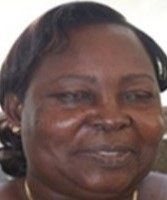Alumni of the Month

Kate Sylvia Magdalene KAMBA
YEAR OF MATRICULATION: 1977
EDUCATION:
Kate Sylvia Magdalene Kamba, née Hamisi, is our ‘Alumna of the Month’ for April. Born on the 12th of June 1951 in Mtandi-Kwitonji village in Masasi District (southern Tanzania), she is the third child of Mr Patrick Peter Hamisi and Mama Mary Edna Hamisi. Kate obtained her early education at Mtandi Lower Primary School (for Standard I–IV 1959-1962), Mtandi Upper Primary School (for Std V, 1963) and Ndwika Upper Primary School (for Std VI–VIII, 1964-1966). Then she proceeded to Mtwara Girls Secondary School (for Form 1–4, 1967-1970) and Jangwani Secondary School in Dar es Salaam (for Form 5–6, 1971–1972), before joining Chang’ombe College of National Education for a Diploma in Education (1973–1974). On completion of the teacher training course, she was posted to Ndanda Secondary School in her home region Mtwara and within her home district Masasi. She taught there for four years from 1974 to 1977.
In 1977, she enrolled at the University of Dar es Salaam for a three-year degree study programme in the social science subjects, earning a BA (honours) in the education and social science subject combinations, a combination?particularly education and political science?that, in 1980, earned her a posting as a tutor at Kivukoni College (then a high-status and ideologically respected training centre for preparing leaders for the nation). Shortly afterwards, Kate won a Parliamentary seat for Masasi district, a political position that involved her on a full-time basis in parliamentary and constituency affairs (not only parliamentary debates and committee work but also dealing with rural farmers’ concerns and needs in Masasi) for a whole five years from 1980 to 1985. In that same period, she was appointed to membership of the Presidential Committee on Cost-Reduction of Government Expenditure (1983–1984) and also elected as General Secretary of the Tanzania Women’s Organisation, UWT (1983–1992). In 1990, Kate Kamba was lucky again to win the Masasi constituency seat in parliamentary for another five years (up to 1995). During very period she also was appointed Regional Commissioner for Mtwara (1992–1994) and Deputy Minister for Industries and Trade (1994– 1995). Apparently, it was this ministerial appointment that pushed her thinking and creativity into issues of entrepreneurship in scientific cashew-nut farming and processing for value-addition and higher profits. In 1996, Mrs Kamba was appointed to membership as a Commissioner on the Presidential Parastatal Sector Reform Commission set up to co-ordinate implementation of the government’s economic reform efforts in the form of privatisation. With this appointment, she could find time and space to pursue an M.A. degree programme in Political Science and Public Administration at the University of Dar es Salaam.
For a stretch of ten years (2001–2012), Kate Kamba was one of the few individuals voted to represent the country in the East African Legislative Assembly (EALA) within the East African Community. From 2017 to-date, she is serving the ruling party, CCM, as Regional Chairperson for Dar es Salaam.
Given her own communal background, plus her actual position and involvement in agricultural and commercial arenas in government, it should not be surprising that Ms. Kate Kamba is a prominent farmer and a processor of cashew nuts in Tanzania. She owns a cashewnut processing factory M/s Perfect Cashew Kernels (T) Ltd., located in Masasi in Mtwara Region, which has the capacity to process 1,350 metric tons of raw cashew nuts per year. She has now retired from government services. It is against the background of this longstanding ‘farmer agri-business interest’ that she was invited, back in January 2004, and participated fully in a regional conference on “Towards Optimizing the Benefits of Clonal Forestry to Small-scale Farmers in East Africa” (in Nairobi, 26–27 January 2004), sponsored by the International Service for the Acquisition of Agri–Biotech Applications (ISAAA), a US-based not-for-profit international organization that facilitates transfer of agri-biotechnology applications, particularly private-sector proprietary technology, from industrial to developing countries. From this very perspective Kate Kamba is a combination of a steady professional, community leader and yet herself a progressive farmer and role-model for the young generation in Tanzania and East Africa.
Again, in reflection of her steadfast career of over three decades, Mrs Kate Kamba has given of her service to quite a number of organisations and institution, particularly her board/council membership to the Cashew-nut Authority of Tanzania (1981–1985), the University of Dar es Salaam (1982–1987), Mtwara Regional Trading Company, General Agricultural Products Board (1983–1985), National Price Commission (1983–1985), the Tanzania Standard Newspapers Limited (1983–1987), Tanzania Housing Bank (1983–1990), and Sokoine University of Agriculture (1996–2016).

